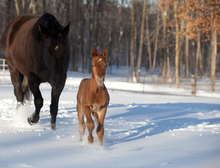Winter is here and while you may be tempted to wrap your horse in a warm blanket and leave the horse in a heated barn for the cold season, avoid that urge. Your horse is better off if you refrain from too much over-coddling him.

Maintaining cold weather horse health
Ensure that your horse stays healthy this winter by using common sense and making sure that the basic needs of water, feed, exercise, grooming and hoof care are not forgotten.
Ensure that your horse stays healthy all season long by using common sense along with these 10 tips for better horse health during cold weather:
- Watch those waterers and don't let them freeze over. A horse will not stay properly hydrated if his water is frozen. Snow and ice are no substitute for clean, unfrozen drinking water. Your horse’s risk of impaction colic is greatly increased if he doesn’t have access to unfrozen water at all times. If you live in a region that experiences below-freezing temperatures, invest in a heating device specifically designed for horse waterers and troughs.
- Increase feed rations when temperatures dip.Talk to your veterinarian about how much feed your horse should receive during the winter months. As the temperatures drop, your horse burns more calories to stay warm. For some horses, this means considerable weight loss. If your horse isn’t on a calorie-restricted diet, consider increasing his hay rations as it gets colder outside. Forage (hay) provides an excellent source of calories. Also, the process of digesting fiber (most hays are high in fiber) helps keep a horse warmer.
- Continjue to exercise your horse. Like humans, horses need exercise all year long, even when it’s cold outside! If possible, continue riding through the winter months. If severe conditions make winter riding impossible, turn your horse out daily in a large pasture or paddock daily; if it’s safe to do so, consider longeing him to keep him fit.
- Don't suddenly begin over riding an out of shape horse. If you only ride when the weather is good, chances are you won’t be doing much saddling up if you live in a cold winter region. That’s ok if you do other things to keep your horse fit, but if he’s a stable potato most of the season, use caution: An out-of-shape horse is at a much greater risk of musculoskeletal injury if exercised hard. If your winter riding schedule is sporadic, based on weather conditions, stick to lighter workouts that won’t over task your horse. Gradually increase his exercise level as his fitness improves.
- Shelter your horse properly. All horses must have shelter from the elements. A three-sided shelter with a roof is a must. If you do bring your horse indoors, try to leave him out during the day and only bring him in at night. And don’t close your barn up! Instead, leave it open to ensure good airflow inside; a closed-up barn leads to poor air quality that can affect a horse’s respiratory health.
- Blanket sensibly. When it’s snowing outside and you’re inside enjoying a warm dinner by the fire, it’s hard not to feel sorry for your horse. To ease the guilt, you may be tempted to rush out and pile yet another blanket on him. Stop yourself right there! Yes, a horse with a full or partial body clip does need blanketing during winter, regardless of whether he’s kept indoors or out. But a horse with his natural winter coat probably doesn’t need blanketing as long as he has shelter from the elements, is receiving proper nutrition and is in good health. Over blanketing a horse can cause him to overheat, which can lead to dehydration and a host of health problems. If you are concerned about your horse’s comfort during winter, talk to your veterinarian about it.
- Continue to provide regular hoof care. Nothing irks a good farrier more than an owner who insists on foregoing hoof care during the winter months. Horses—barefoot or shod, ridden or not—need regular farrier care every six to eight weeks, maybe even more often, regardless of the season.
- Groom your horse regularly—daily if possible. Regular grooming and handling provides the opportunity to evaluate your horse and alerts you to problems such as illness, injury, weight loss, lost shoe, cracked hooves, et cetera. It’s up to us, as owners, to intervene as quickly as possible when something is wrong. Catching a problem early on helps put your horse back on the track to good health.
- Don't turn your horse out in the pasture and forget about him. There’s an old cowboy adage out there, “no rest for the horseman.” Even if your horses are in pasture, you still have lots of work to do! Watering, feeding, grooming, exercising..
- Pay attention to your own health. Remember, if you’re not healthy, you won’t be able to care for your horse. When tending to your horsekeeping tasks this winter, stay warm, stay safe and stay healthy because there’s someone counting on you every day.
Note - Still-timely article was first posted on EquiMed.com in 2018
